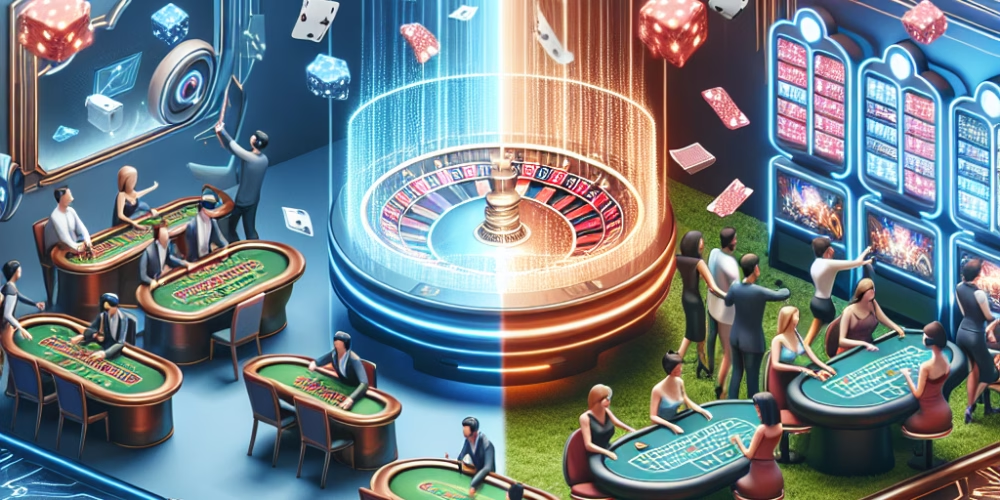In recent years, the gambling industry has witnessed a remarkable transformation, driven by technological advancements and shifting consumer preferences. Among the most revolutionary developments is the emergence of virtual reality (VR) casinos, which promise to redefine players’ gaming experiences. This trend not only enhances user engagement but also opens new avenues for revenue and interaction in the digital age.
Revolutionizing the Player Experience Through Immersive Technology
Virtual reality casinos are quickly gaining traction as they provide an immersive gaming experience that closely mimics a physical casino environment. Players can walk through digitally rendered casino floors, interact with other players and live dealers, and engage in games with a 360-degree view of their surroundings. This level of immersion was once a fanciful notion, but it’s now becoming a functional and dynamic component of the modern gambling ecosystem.
The technology used in VR casinos is cutting-edge, employing high-quality graphics and responsive VR headsets that transport players into a meticulously crafted world. This push towards virtual environments is being bolstered by improvements in VR technology and more accessible pricing, which together are making VR casinos more appealing to a broader demographic.
Increasing Accessibility and the Impact on Traditional Gambling Venues
One of the most significant impacts of VR casinos is their ability to draw in players who might not have easy access to physical casino locations. For residents in rural areas or regions where gambling is restricted, VR casinos offer a viable alternative that respects legal boundaries yet provides an engaging gambling experience.
However, this shift has raised questions about the future of traditional gambling venues. While some experts argue that VR casinos will complement rather than replace physical locations, others suggest a potential decrease in visitor numbers as more people opt for the convenience of gambling from home. Despite these concerns, many traditional casinos are embracing VR technology, adding VR rooms and experiences to attract tech-savvy visitors and provide blended experiences.
The Role of Regulation and Fair Play
As with any major innovation in gambling, regulation is a critical factor. Ensuring the security of financial transactions and the fairness of play in VR casinos is paramount. Regulatory bodies are currently exploring frameworks to deal with these new forms of gambling. The challenge lies in creating regulations that protect players and ensure responsible gambling while fostering the growth and integration of technology.
Fair play also remains a top priority, with VR casino developers and regulatory bodies working hand-in-hand to implement Random Number Generators (RNGs) and other fairness assurance measures within VR games. These efforts are crucial for maintaining player trust and the credibility of virtual gambling venues.
Market Growth and Future Outlook
The market for VR casinos is projected to grow significantly in the coming years. According to a recent market analysis, the global VR gambling market is expected to expand at a compound annual growth rate of approximately 15.6% over the next decade. This growth is fueled by the increasing ownership of VR devices and a surge in internet penetration worldwide.
Furthermore, as VR technology continues to evolve, future iterations of VR casinos are expected to become even more sophisticated. Innovations such as augmented reality (AR) could further blur the lines between physical and digital gambling experiences, creating even more dynamic and engaging environments for players.
FAQs about Virtual Reality Casinos
Q: Can anyone access a VR casino?
A: While most VR casinos aim to be as inclusive as possible, players typically need to own a VR headset and meet the legal age requirements for gambling in their jurisdiction.
Q: Are VR casinos safe and secure?
A: Reputable VR casinos employ advanced security measures to protect player data and ensure fair play. However, as with any online activity, players should undertake their own research to ensure they are using a trusted platform.
Q: How realistic are the games in VR casinos?
A: VR casinos strive to mimic the look and feel of real-life casinos, with realistic graphics, sound effects, and interactions. The realism is continually improving with technological advancements.
Key Takeaways
– Technological Integration: VR casinos represent a significant leap in integrating technology with traditional gambling, offering players immersive and realistic experiences.
– Accessibility vs. Impact: These platforms provide unprecedented access to gambling but may impact traditional venues.
– Regulatory Challenges: The rise of VR gambling presents new challenges for regulators tasked with ensuring fair play and security in a completely digital environment.
– Market Growth: With rapid advancements in technology and increasing consumer interest, the VR casino market is poised for substantial growth.
Virtual reality casinos are not just a fad but a peek into the future of gambling. As they become more sophisticated and accessible, they are set to transform the industry in ways we can only begin to imagine.

Erik Agary is a seasoned writer at True Games Reviews, specializing in gaming, casino games, and interactive entertainment. With a passion for all things digital, Erik dives deep into the latest trends and developments in the gaming world, offering insightful reviews and detailed analysis. His expertise spans across multiple gaming platforms, ensuring comprehensive coverage that resonates with both novice and experienced gamers alike.


